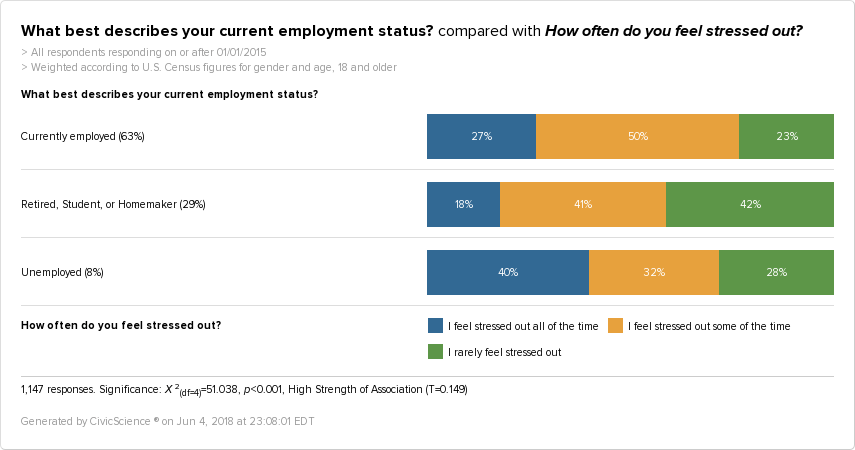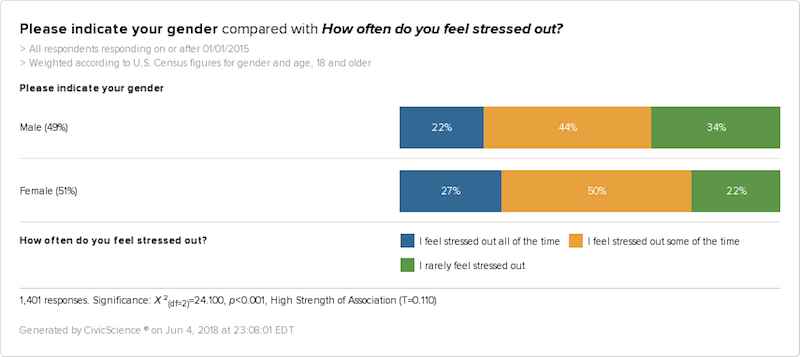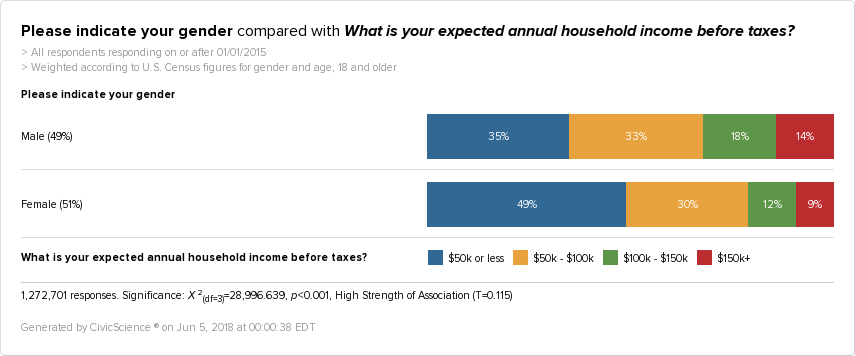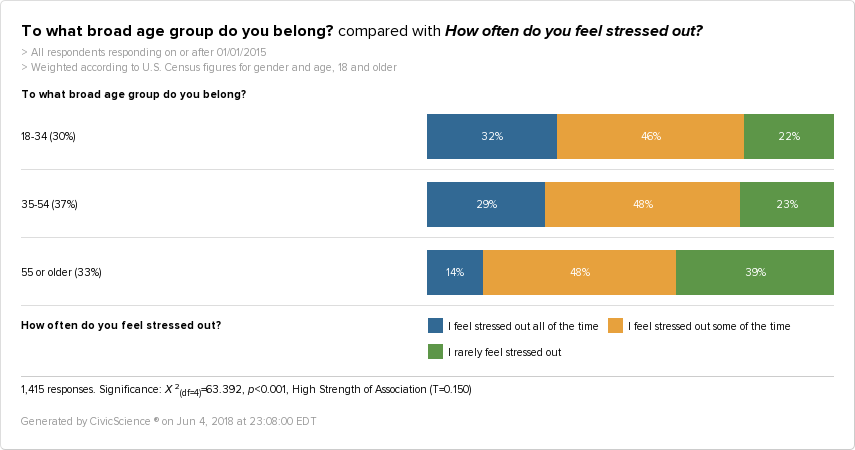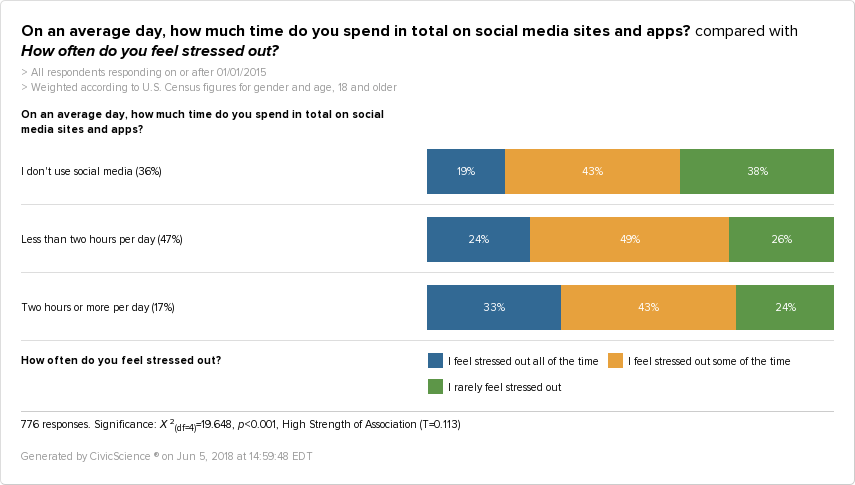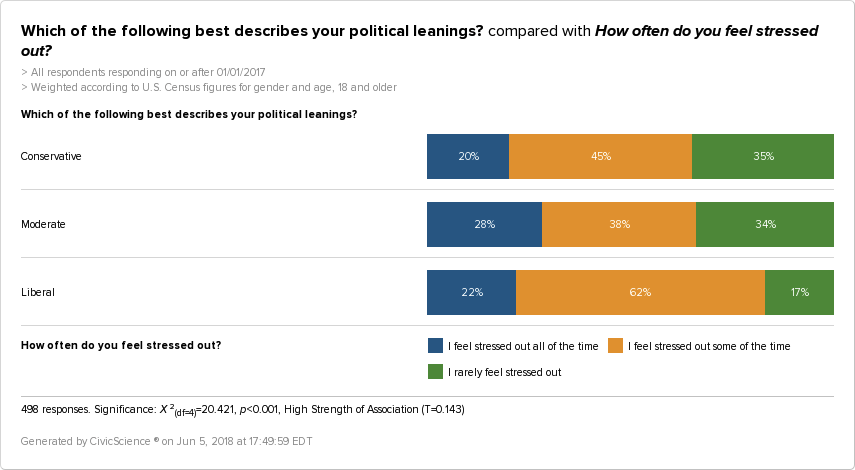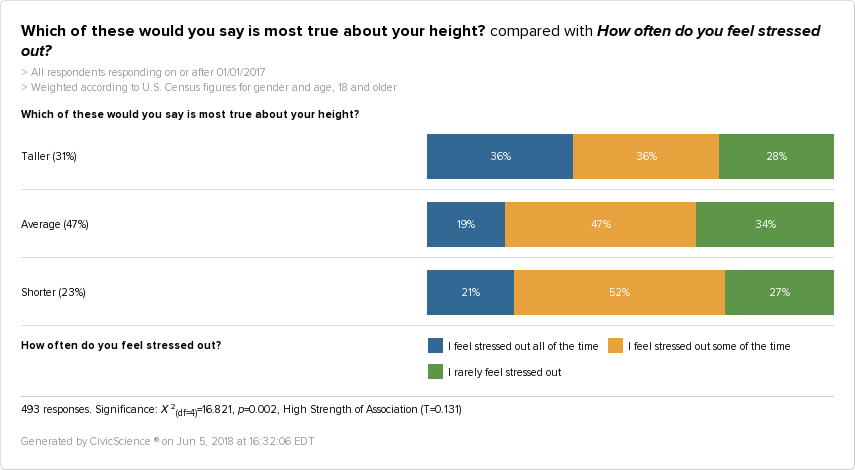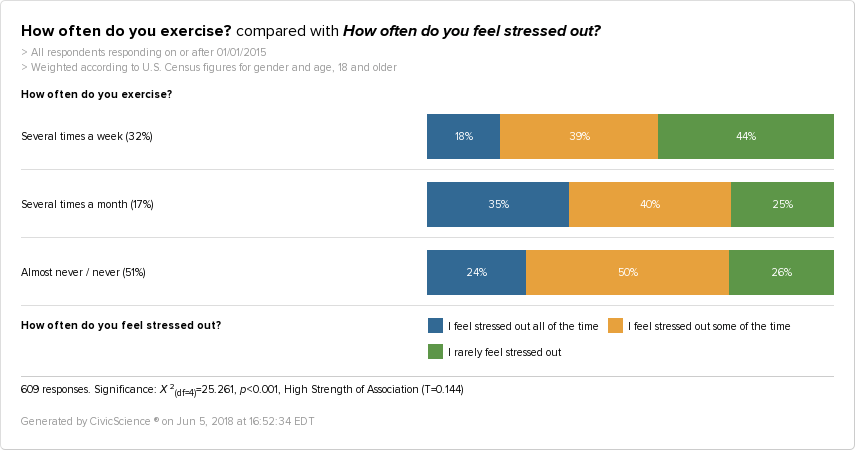The Gist: One-quarter of American adults feel stressed out on a daily basis. A broad look shows that low-income earners, as well as women, Millennials and Gen Xers, social media users, and political moderates are the most burdened by stress.
Stress — we all experience it at times, but some of us more so than others.
We found that 25% of U.S. adult respondents say they feel stressed out all of the time and 47% feel stressed out some of the time.
That may seem modest but then consider this. On a daily basis, 19% say they are very stressed out, while 52% say they are somewhat stressed out.
71% of U.S. adults say they experience some degree of stress on a daily basis.
The stress response, a cascade of events stemming from the release of cortisol and other stress hormones, is great for running from a predator, playing sports, or meeting a deadline; it’s not so great on a consistent basis over a long period of time, what the APA defines as chronic stress.
Researchers are now uncovering the toll that chronic stress takes on the body, linking it anywhere from anxiety disorders to cardiovascular disease to Alzheimer’s, and that list is growing.
Just how much stress is too much to undergo daily without having negative effects on mind and body is the medical researcher’s territory. However, we can offer a more detailed view of who is stressed and some reasons why.
So, who’s stressing?
Low-income earners and the unemployed are more stressed.
According to recent research from the APA, money and work are top stressors, which should come as no surprise. When looking at a 4-tiered income breakdown, our data shows that Americans who make under $50K per year reported more stress than others:
The high-stress levels of the $50K or less crowd are undoubtedly bumped up by unemployed folks (making up 23% of that income bracket), who experience significantly more stress than those with jobs, retirees, students, or homemakers. Forty percent of the unemployed say they feel stressed out all of the time.
So if you have a low-paying job or no job at all, you’re more likely to be chronically stressed. In general, the more you earn, the less stressed you are; 40% of those who make $150K per year or above rarely feel stressed out.
And if you are lucky enough to not work by choice, there’s a better chance that you’ll be less stressed than someone employed or unemployed. A significant 42% percent of retirees, students, or homemakers say they rarely feel stressed out.
When it comes specifically to debt, you’d think that debt (especially student loan debt) would be a major stressor. But overall, we see those with debt aren’t much more stressed than those without it. It turns out that 25% of those with debt feel stressed out all of the time, while 21% of those without debt feel the same.
Income more so than debt seems to be a decisive factor in stress levels. But how much does income play a role when considering other trends, such as gender and age?
Women are more stressed.
When it comes to gender, we’re seeing that women report slightly higher stress levels. They are 22% more likely than men to feel stressed out all of the time and 13% more likely to feel stressed out some of the time. That works out to men reporting they are 35% more likely than women to “rarely feel stressed out.”
While the APA stated in a 2015 study that family issues were on the rise among adult stressors, both men and women still equally cited money and work as stressors.
And given that female respondents earn less than male respondents overall gives further weight to income playing a key role in elevated stress levels, as seen here:
Millennials and Gen Xers are stressing.
Our data shows that 32% of Millennials say they feel stressed out all of the time, while Gen Xers come in second at 29%. There are more than twice as many Millennials and Gen Xers as Baby Boomers who feel stressed out all of the time.
When it comes to income, Millennials make less than older age groups. Plus, they are more likely to be single without kids; married people and parents report lower stress levels. A two-person income household likely takes some of the stress off of finances that singles experience, but may also serve other de-stressing purposes, like providing an emotional support system.
Still, there may be generational cultural differences on top of income, job, and relationship status that are feeding into why Millennials are more stressed.
Social media users are more stressed.
We’re seeing that the more time you spend on social media, the more likely you are to be stressed out.
We know that Millennials are heavier social media users than Gen Xers and significantly more so than Baby Boomers. You might think it’s a chicken and egg scenario — is social media usage adding to stress levels or is it just a correlation? Consider that we see that heavier Netflix users (also more likely to be Millennials) report higher stress levels, but it’s unlikely that Netflix is actually causing stress. If anything, it should be helping to reduce it (i.e. ‘Netflix and chill’).
Yet there’s reason to believe that social media induces stress. A study from the Journal of Social Psychology found that stress hormone levels decreased when active Facebook users took a ‘vacation’ for a few days. Yet, the study also warned that taking social media vacations could backfire and leave users feeling disconnected from social circles, which could actually cause more stress.
Political moderates are the most stressed.
When you’re plugged in through smartphones, devices, and computers during all waking hours, it’s hard to avoid the never-ending news feed.
Connect that to the political climate unleashed with the 2016 election, and it’s easy to assume that stress levels should be on the rise. However, the APA found that stress levels overall haven’t risen since 2016, but they do report that more than 50% of Americans (from both political parties) reported more stress over the future of the country and social divisiveness than they did over money and work issues.
Our data shows that since January 2017, both conservatives and liberals experience similar amounts of heavy stress.
More liberals are stressed overall, with only 17% saying they rarely feel stressed out compared to 34-35% of conservatives and moderates. That’s not a meager difference.
However, it’s political moderates, which make up the largest chunk of our polling population (40%), who seem to experience the most chronic stress. Nearly 30% of moderates feel stressed out all of the time, compared to 19% of conservatives and 21% of liberals.
Here are some additional tidbits we dug up.
- Very tall people are more stressed. It appears that those who say they are ‘much taller’ than most people of their age and gender have significantly higher stress levels than those who say they are average or shorter.
- Those who say they’re ‘somewhat less physically attractive’ than others their age or gender are less stressed. We see that 44% of that category claim to rarely feel stressed out, more so than those who perceive themselves to be ‘somewhat more physically attractive’ (27%) or ‘much more physically attractive’ (34%). However, those who say they are ‘much less physically attractive’ are disproportionately more chronically stressed than anyone in the survey, with 59% saying they feel stressed out all of the time.
- Regular exercisers are less stressed. Those who exercise several times a week are much less stressed than those who don’t. Surprisingly, those who exercise monthly report more stress than those who rarely or never exercise.
Exercise may be one way to reduce stress levels. Still, if income has a heavy hand in stress, then increasing your income may lead to a reduced stress load. That’s easier said than done for many, especially young people who may be compounded by other stressors, such as social media usage.



